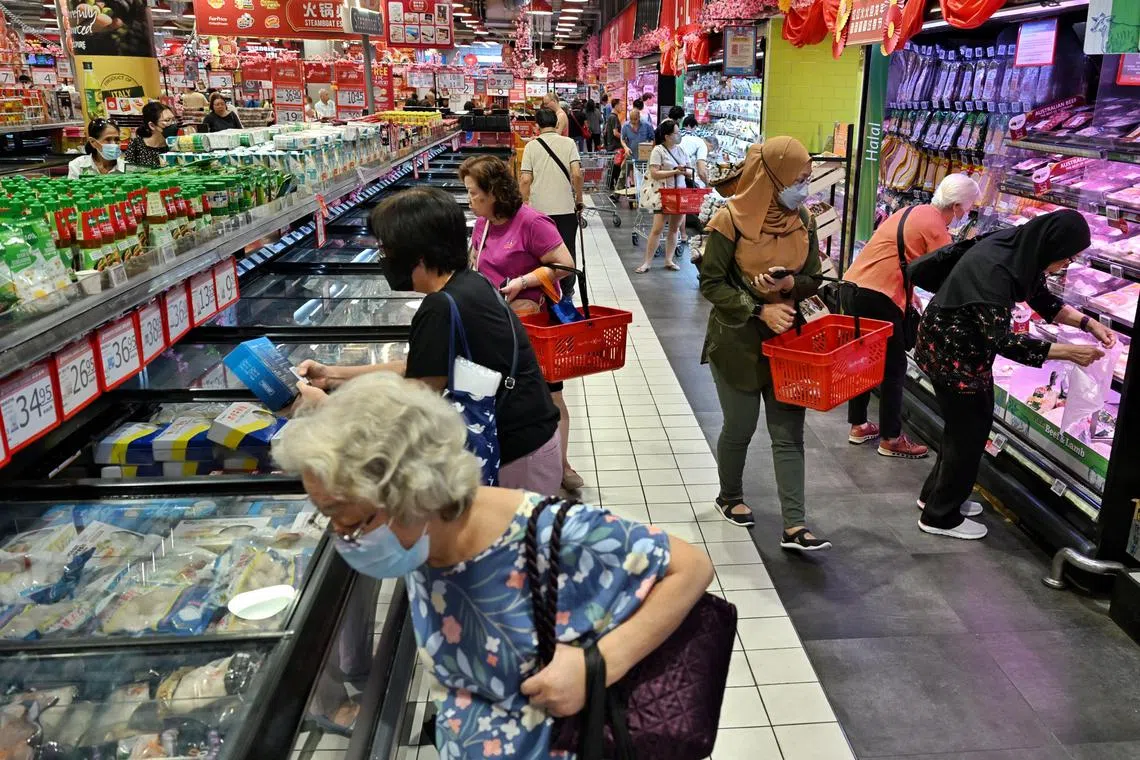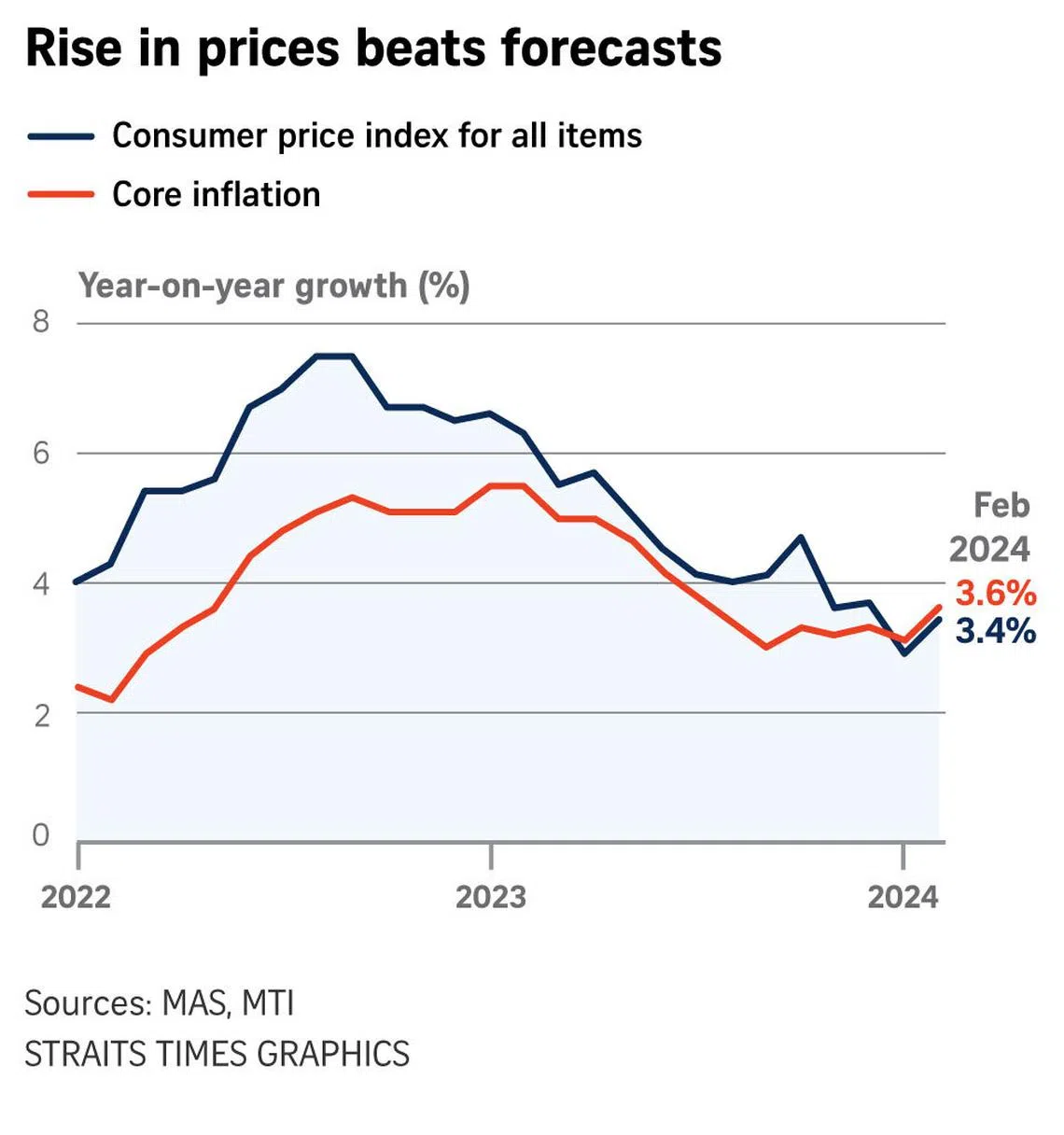Singapore core inflation rises more than expected to 3.6% in February
Sign up now: Get ST's newsletters delivered to your inbox

Consumer prices shot up in February on the back of higher services and food inflation partly linked to Chinese New Year spending.
PHOTO: ST FILE
SINGAPORE - Consumer prices in February shot up more than expected on the back of higher services and food inflation partly linked to Chinese New Year spending.
Official data released on March 25 showed that core inflation, which excludes private transport and accommodation costs to better reflect the expenses of households here, rose to 3.6 per cent year on year in February, up from January’s 3.1 per cent.
This was the highest reading for core inflation since July 2023.
Overall or headline inflation also jumped to 3.4 per cent in February from 2.9 per cent in January, on the back of a pickup in accommodation inflation.
As Chinese New Year fell in February in 2024 but in January in 2023, year-on-year inflation in February was boosted by seasonal factors associated with the festivities, the Ministry of Trade and Industry (MTI) and the Monetary Authority of Singapore (MAS) said in their joint report.
Still, the rise in February’s core and overall consumer prices beat analyst forecasts. A Reuters survey of economists had tipped core inflation to come in at 3.4 per cent and overall inflation at 3.3 per cent.
Oxford Economics senior economist Alex Holmes said the increases are much higher than expected, but noted that there are a few caveats to the trend.
“Much of the rise appears to be seasonal, perhaps related to the shifting timing of Chinese New Year. Seasonally adjusted adjusted data shows much more modest month-on-month upticks for both headline (up 0.04 per cent) and core consumer price index (up 0.3 per cent),” he said.
OCBC Bank chief economist Selena Ling noted that while some of the Chinese New Year-related temporal effects will fade, the key determinants going forward are the state of the domestic labour market and services inflation.
“Interestingly, hospitality- and entertainment-related inflation may not subside significantly in March due to the increased international visitor arrivals for the Taylor Swift concerts,” she said.
On a month-on-month basis, which represents how much momentum there still is in prices, core consumer prices edged up 0.5 per cent in February, while headline CPI went up by 1 per cent.
Mr Holmes noted that the rise in headline CPI month on month was mainly driven by the volatile accommodation component.
“Given the downward pressure on rents from increased housing supply, we doubt this trend will continue. Indeed, it will probably reverse somewhat,” he said.
He noted that food price inflation continues to run ahead of the overall CPI, while increases in recreation and cultural activity prices, particularly holiday expenses, remain especially high.
“While we had thought there was some chance the MAS would look to loosen policy in April, that’s looking increasingly unlikely now,” added Mr Holmes.
Ms Ling said the inflation outlook trajectory remains a tad bumpy in the near term, but largely on track to ease over the medium term.
As for the April monetary policy review, she said MAS is still likely to stay on hold, given that there is no urgency to recalibrate.
Some analysts have been expecting MAS to loosen its monetary policy or weaken the Singdollar
Data showed that accommodation inflation picked up the most in February, to 3.9 per cent, up from 2.1 per cent in January.
This was led by the additional service and conservancy charges (S&CC) rebates that were disbursed in January. As additional S&CC rebates were not given in February, year-on-year inflation for housing maintenance and repair rebounded in February.
Services inflation rose to 4.2 per cent, mainly due to higher airfares and a steeper increase in holiday expenses, while food inflation went up to 3.8 per cent.
Bucking the trend was private transport inflation, which recorded the largest decline in February due to a slower rate of increase in car prices. Private transport inflation was down to 1.4 per cent, lower than the 2.9 per cent in January.
Electricity and gas inflation dipped slightly to 5.2 per cent in February, led by a slower pace of increase in electricity costs.
Inflation for retail and other goods also edged lower to 1.2 per cent in February, from 1.4 per cent the previous month.

Correction note: This article has been edited for accuracy.



